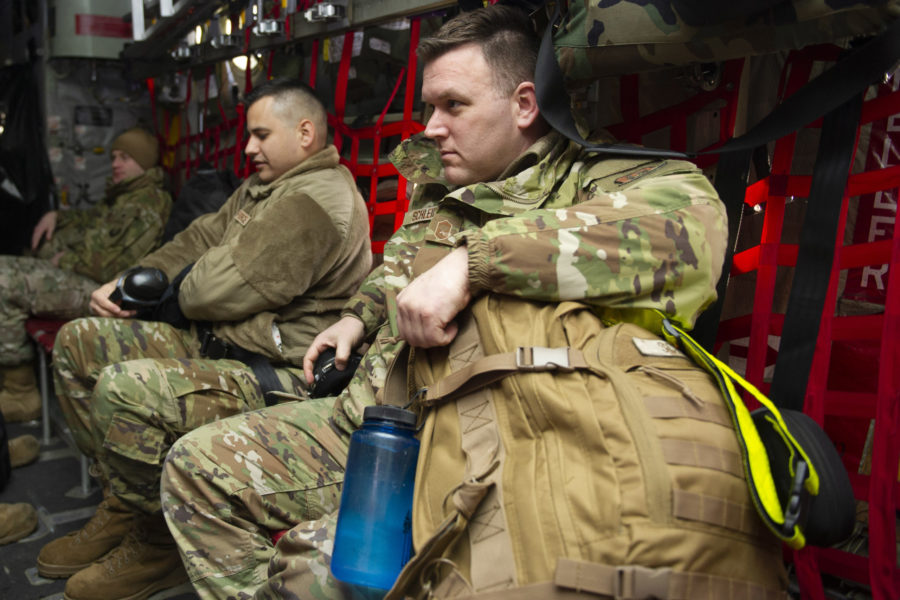The U.S. can deter Russian aggression in Ukraine now with a series of steps ranging from economic sanctions to changing fighter pilots’ rules of engagement, retired former commander of U.S. European Command and NATO Supreme Allied Commander Gen. Philip M. Breedlove told Air Force Magazine.
After recognizing the independence of separatists in the self-declared republics of Donetsk and Luhansk in the Donbas region of Ukraine, Russian President Vladimir Putin sent in armored vehicles and tanks late Feb. 21 in what he called a peacekeeping force.
The move followed a sustained period of heavy shelling by the separatists against Ukrainian targets in recent days, an escalation that Ukrainian government forces have not retaliated against.
Russia has provided support to the separatists since 2014, but Putin only recognized their independence hours before sending in troops.
Under the circumstances, the U.S. “could put ready and capable forces forward right now,” said Breedlove, who was NATO commander from 2013 to 2016, when Russia invaded Ukraine and annexed Crimea.
Breedlove, who also served as commander of U.S. Air Forces in Europe, pointed out that the U.S. had already begun to move forces to the eastern flank of NATO. Small Army Stryker units have deployed to Romania and will soon deploy to Bulgaria; 4,700 troops from the 82nd Airborne Division have deployed to Poland; and a total of 24 F-15s and F-16s have deployed on air policing missions to Poland and Romania.
Yet Breedlove said U.S. deterrence strategy must advance in the face of Russia’s active military intervention.
Breedlove said the U.S. and NATO should move to active deterrence.
“Right now, we are in passive deterrence, and Mr. Putin is in active measures,” Breedlove explained. “That’s why I think we see, now, Russians moving into Ukraine.”
Sanctions
Breedlove recently visited Ukraine with a delegation of former U.S. ambassadors to Ukraine and Russia. There, he met with Ukrainian President Volodymyr Zelensky and Ukrainian defense officials. In recent weeks, Breedlove has also advised senior U.S. military and NATO officials on the crisis, calling for immediate economic and military adjustments.
“In order to move to active deterrence, I believe we need to start putting sanctions on immediately,” Breedlove said.
President Joe Biden has promised that any “further invasion” of Ukraine by Russia would trigger economic sanctions, and Pentagon Press Secretary John F. Kirby has said any movement by Russia into the Donbas region, which is controlled by Russian-backed separatists, would constitute such an invasion.
However, Biden walked back his commitment to sanctions in January, suggesting that a “minor incursion” would trigger a lesser response.
Breedlove called on the administration to match rhetoric with actions and stay tough on Russia before Putin pushes farther into Ukrainian territory.
“So, let’s have it. Let’s see it. Bring it. Keep your promise,” Breedlove insisted.
Air Defense Rules of Engagement
Breedlove said another adjustment that the U.S. must make now is to change the rules of engagement under which Air Force fighter jets in Eastern Europe fly—from air policing to air defense. This would help to better defend NATO allies and to protect American pilots.
“Right now, for instance, if a U.S. fighter is flying over Poland and encounters Russians doing nefarious business, and he’s on an air policing mission, the U.S. pilot can do nothing, nada, zilch unless he’s shot at. Unless fired upon, he can take no action,” Breedlove explained.
“They are entirely a peacetime set of rules of engagement. They have no applicability at all in a conflict,” he continued of the air policing missions. “They are dangerous to our pilots in wartime. We need to move from air policing to air defense rules of engagement.”
The former NATO supreme allied commander said making the change is “eminently important” and that not doing so would be “dangerous for our people right now.” Making the change would also constitute an active deterrent measure.
“That’s a big signal to Mr. Putin,” Breedlove said.
Strong Reply by NATO
The retired four-star Air Force general also called on NATO to act as an alliance in its troop and airpower deterrence measures rather than individual member states offering security enhancements as the United States and other allies have offered to eastern flank members nearest the Russian border.
It matters that “NATO gets its skin in the game with NATO forces, not individually offered NATO contributions, bilaterally to the effort, which is what’s going on now,” Breedlove said.
Breedlove applauded German Chancellor Olaf Scholz’s announcement, in response to Russia’s entering the Donbas region, that Germany would rescind certification of the Nord Stream 2 pipeline to bring natural gas from Russia to Germany. It will be harder, Breedlove said, for European states dependent on Russian petroleum and gas to make similar decisions.
But Breedlove believes a unified NATO reaction, in addition to military signaling, are the only effective responses to deter Putin from further invasion.
Putin, in moving his “peacekeeping” forces into the region, indicated they may go beyond demarcation lines in the Minsk protocol of 2014 that quelled the conflict between Ukraine and the Russian-backed separatists in Donetsk and Luhansk.
“If we bring it ‘weak’ now, then we might see him expand those pockets,” Breedlove said. “I am a bit optimistic that we’re going to get a better NATO reply here than not.”
